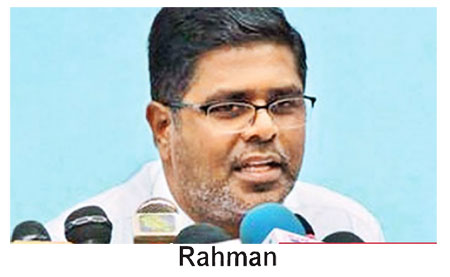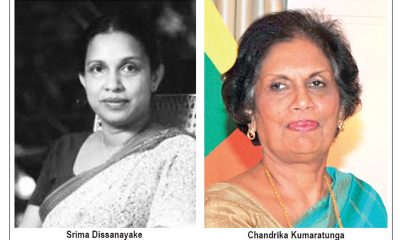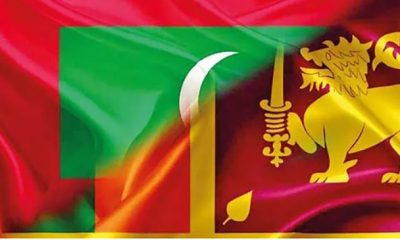News
MP Rahman ridicules SLN patrols, having allowed foreigners entry via BIA

Spike in Covid-19 cases: SJB blames SLPP for giving false sense of security
by Shamindra Ferdinando
The Samagi Jana Balavegaya (SJB) yesterday (3) said that the government owed an explanation regarding the Covid-19 explosion now threatening the entire country after repeatedly assuring that the epidemic was under control.
SJB Colombo District lawmaker Mujibur Rahman alleged that the government strategy gave a false sense of security to the public thereby resulting in automatic lowering of the guard. MP Rahman said that those who spoke on behalf of the government played politics with the pandemic.
They created an environment conducive for the people to go on pilgrimages to Kataragama and on holiday to Nuwara
Eliya during Sinhala and Tamil New Year, the MP pointed out. The live television coverage of various events organized with the participation of artistes, models et al and avurudu beauty pageants deceived the people, the MP said.
The shocking revelation that the government allowed visitors from India in spite of the pandemic there being out of control proved those in power here threw caution to the wind, the former UNP lawmaker said.
Responding to another query, lawmaker Rahman questioned the rationale in the SLN stepping up surveillance at the Indo-Lanka Maritime boundary to prevent illegal immigrants while Indians were allowed in through the Bandaranaike International Airport (BIA). MP Rahman emphasized that he didn’t have an issue with Indians or people of any other nationality. But, the country was in such a precarious situation, the government couldn’t take things lightly, MP Rahman said.
In the run-up to the Sinhala and Tamil New Year, the government conveniently reported a far lower number of Covid-19 cases, MP Rahman said, adding that according to statements attributed to officials the situation continued to improve. Against the backdrop of threat posed by a new variant of Covid-19, the government on Feb 14 ruled out a lockdown, MP Rahman said. One-time Speaker W.J.M. Lokubandara succumbed to Covid-19 at the IDH on the same day, the SJB spokesman said, adding that the total number of Covid-19 cases was placed at 801 on Feb 14. Lokubandara’s death was among 7 reported on that day, the MP said. Within the next few weeks the situation remained the same though closer to Sinhala and Tamil New Year reported cases dropped as a result of reducing the number of tests conducted, MP Rahman said.
Rahman said that the government reported 197 Covid-19 cases on April 1, 183 on April 2, 135 on April 3, 122 on April 4, 137 on April 5, 158 on April 6, 190 on April 7, 309 on April 8, 183 on April 9, 268 on April 10, 225 on April 11, 225 on April 12, 185 on April 13, 99 on April 14, 167 on April 15 and 159 on April 16.
The MP said that the government allowed more foreigners in though Chief Epidemiologist Sudath Samaraweera on April17 said that due to an alarming increase in the number of Covid-19 cases among those coming from abroad restrictions were necessary. The SJB spokesman asked whether the government heeded Dr. Samaraweera’s warning. On the day, the Chief Epidemiologist issued the warning, the government reported 204 fresh Covid-19 cases.
The government was so reckless in its Covid-19 strategy, declaration was made about the re-opening of schools in the Western Province as well as the Universities, the MP. However, at the same time the government exploited the deteriorating situation to cancel May Day rallies primarily because the SLPP led coalition was sharply divided over a range of contentious matters, MP Rahman said.
MP Rahman alleged that SLPP members largely depend on rhetoric to skip ongoing debate on deterioration of Covid-19 situation. Referring to a recent media briefing given by the Sri Lanka Medical Council (SLMC) and statement issued by Dr. Naveen Zoysa on behalf of the GMOA, MP Rahman said that the country faced an immense challenge.
Who allowed interested parties to offer quarantine facilities to foreigners when Sri Lankans were arrested for not wearing face masks? MP Rahman asked.
Rahman urged the government to reveal the outcome of second Covid-19 outbreak in late last year. No less a person than Attorney General Dappula de Livera PC, called for a probe on what he called ‘Brandix Cluster,’ the MP recalled. “Let there be an explanation soon on the part of the government,” Rahman said, urging the SLPP to take tangible measures to tackle the situation. MP Rahman said that the second Covid-19 eruption was also discussed in parliament. At one point, an attempt was made to fault Ukrainians over the epidemic eruption, the MP said.
Latest News
GovPay Concludes 2025 with Rs. 2 Billion in digital transactions, marking a major milestone in Sri Lanka’s digital transformation

GovPay, Sri Lanka’s Government Digital Payment Platform concluded the year 2025 by surpassing Rs. 2 billion in total digital transaction value, marking a major milestone in the country’s digital transformation journey. Notably, GovPay doubled its collections from Rs. 1 billion to Rs. 2 billion in just 45 days, reflecting rapid adoption, growing public trust, and strong institutional uptake across the public sector.
Since its official launch on 07 February 2025, GovPay has processed over 69,000 digital transactions, enabling payments for 3,372 government services across 215 government institutions. This accelerated growth underscores the increasing reliance on secure, convenient, and transparent digital payment mechanisms by both citizens and government institutions.
Implemented under the strategic leadership of the Ministry of Digital Economy, the Information Communication Technology Agency of Sri Lanka (ICTA) in collaboration with LankaPay, GovPay has emerged as a key pillar of Sri Lanka’s national digital public infrastructure. The platform plays a critical role in advancing financial inclusion, improving service efficiency, and strengthening transparency in public service delivery.
A key milestone in 2025 was the launch of the Online Traffic Fine Payment System through GovPay on 10 April 2025. Since its introduction, the system has facilitated over 50,000 digital traffic fine payments, generating more than Rs. 66 million in revenue. The service is currently operational across the Western, Southern, Northern, North Western, and North Central Provinces, including the Southern, Katunayake, and Central Expressways. While the island wide rollout planned for December 2025 was postponed due to adverse weather conditions and disaster-related challenges, ICTA, in coordination with the Sri Lanka Police and with the support of LankaPay, has agreed to complete the nationwide rollout in January 2026, with a landmark launch in the Central Province.
GovPay has continued to expand its reach across local authorities, including Divisional Secretariats, Municipal Councils, Urban Councils, and Pradeshiya Sabhas, significantly enhancing access to government services in citizens’ day-to-day activities. The platform has enabled digital transactions for all local authorities in the Northern Province and all Divisional Secretariats in the Southern Province, with a national target to digitize all local authorities by 2026.
Institutions such as Kotelawala Defence University, Sri Lanka Police, the Department of Technical Education and Training, the University of Moratuwa, and the Sri Lanka Atomic Energy Board emerged as some of the highest contributors to GovPay in 2025. Strong adoption by the education sector in particular highlights the readiness of younger generations to embrace digital transformation and demonstrates the platform’s scalability and reliability.
Beyond routine government services, GovPay also supported national disaster response efforts. Since 30 November 2025, the platform facilitated digital donations to the Rebuild Sri Lanka Disaster Relief Fund, collecting almost Rs. 14 million across 909 transactions, including contributions from Sri Lankans living abroad, ensuring transparency and ease of contribution during a national emergency.
As GovPay continues to grow, ICTA is working on revamping www.govpay.lk with enhanced features to support institutional onboarding, service management, and reporting capabilities. With Rs. 2 billion in digital collections achieved within its first year of operation and the last Rs. 1 billion reached in just 45 days, GovPay stands as a strong testament to the impact of coordinated digital transformation, reinforcing Sri Lanka’s vision of achieving a USD 15 billion digital economy by 2030.
News
Swift restoration of Religious, Cultural and Archaeological sites damaged by the disaster

A discussion on the restoration of religious, cultural and archaeological sites affected by Cyclone Ditwah was held on Thursday (18) afternoon at the Presidential Secretariat under the patronage of the Minister of Buddhasasana, Religious and Cultural Affairs, Dr. Hiniduma Sunil Senevi, with the participation of the Most Venerable Mahanayaka Theras of the three Chapters and other religious leaders.
Addressing the meeting, the Minister stated that more than one thousand religious, cultural and archaeological sites across the country had sustained damage due to the disaster. He assured that prompt measures would be taken to commence restoration work and reinstate these sites to their original condition without delay.
The Minister further stated that all restoration work is expected to be carried out while preserving the historical and cultural authenticity of the sites, under the guidance of the Most Venerable Maha Sangha and other religious leaders, with the active participation of all relevant stakeholders.
The Secretary to the Ministry of Buddhasasana, Religious and Cultural Affairs, Prince Senadheera, noted that arrangements are currently underway to mobilize the required human resources and financial assistance for the restoration process. He also stated that steps have been initiated to recruit the necessary technical officers on a contractual basis to conduct technical assessments of the affected sites. In addition, plans are in place to involve officials of the Ministry as well as officers of its affiliated institutions in carrying out these restoration activities.
The Secretary to the Ministry further stated that generous financial contributions from donors are currently being received to the fund established under the Ministry of Buddhasasana, Religious and Cultural Affairs for the reconstruction of damaged religious places of worship.
The meeting also considered continuing the gathering as an interfaith committee to oversee the restoration activities. Accordingly, it was agreed that the progress of construction work would be regularly reported to the committee and that the committee would be entrusted with mobilizing support for the fund in a transparent manner, including assistance from foreign donors, international organizations, Buddhist organizations and other religious institutions.
It was noted that the Central Cultural Fund has identified eight sites that were severely damaged by the disaster and are difficult to restore through conventional construction methods, requiring the specialized expertise of archaeologists, mural conservation specialists, and architects. The cost of restoring these sites has been estimated at over Rs. 500 million.
It was further decided that the committee would meet once a month to review and discuss the progress of these restoration activities.
Religious leaders commended the Government’s intervention in providing relief to those affected by the disaster and in restoring livelihoods, expressing appreciation for the effective management of the response. They also praised the Government’s prompt action in initiating restoration work at damaged religious sites.
The event was attended by several eminent religious leaders, including the Registrar of the Asgiri Maha Viharaya, Venerable Dr. Medagama Dhammananda Nayaka Thero; the Registrar General of the Amarapura Siri Saddhammawansa Maha Nikaya, Venerable Balapitiye Siri Seevali Nayaka Thero; the General Secretary of the Sri Lanka Ramanna Maha Nikaya, Venerable Attangane Sasanarathana Nayaka Thero; the Chief Secretary of the All-Ceylon Shasanarakshaka Board, Venerable Professor Mugunuwela Anuruddha Nayaka Thero; and the Tri-Nikaya Maha Sangha, led by the Chairman of the National Bhikkhu Front, Venerable Wakamulle Uditha Thero.
Also in attendance were Hindu religious leaders, including Venerable Swami Aksharatmananda, representatives of the Catholic Church and the National Christian Council, including Father Alec Roy Samantha Fernando, All-Ceylon Muslim religious leaders, including the General Secretary of the Jamiatul Ulama Organization, Ash-Sheikh Arkam Nooramith, Deputy Minister of Religious and Cultural Affairs, Mohamed Muneer , as well as senior officials of the Ministry of Buddhasasana, Religious and Cultural Affairs and relevant line institutions.
Latest News
Landslide early warnings issued to the Districts of Badulla, Kandy, Kurunegala, Matale and Nuwara Eliya extended

The landslide early warning center of the National Building Research Organisation [NBRO] has extended the landslide early warnings issued to the Districts of Badulla, Kandy, Kurunegala, Matale and Nuwara Eliya until 08:00 AM on Saturday [20th].
LEVEL III RED landslide early warnings have been issued to the Divisional Secretaries Divisions and surrounding areas of Minipe, Ududumbara, Doluwa and Medadumbara in the Kandy district, and Mathurata, Walapane, Hanguranketha and Nildandahinna in the Nuwara Eliya district.
LEVEL II AMBER landslide early warnings have been issued to the Divisional Secretaries Divisions and surrounding areas of Badulla, Lunugala, Passara and Hali_Ela in the Badulla district, Akurana, Pathadumbara, Udunuwara, Gangawata Korale, Pasbage Korale, Harispattuwa, Thumpane, Panvila, Ganga Ihala Korale, Udapalatha, Yatinuwara, Poojapitiya, Kundasale, Deltota, Pathahewaheta and Hatharaliyadda in the Kandy district, Rideegama in the Kurunegala district, Laggala Pallegama, Wilgamuwa, Yatawatta, Ambanganga Korale, Naula, Rattota, Pallepola, Ukuwela and Matale in the Matale district, and Nuwara Eliya in the Nuwara Eliya district.
LEVEL I YELLOW landslide early warnings have been issued to the Divisional Secretaries Divisions and surrounding areas of Bandarawela, Uva Paranagama, Haldummulla, Kandeketiya, Soranathota, Ella, Welimada, Haputhale and Meegahakivula in the Badulla district, Alawwa, Polgahawela, Mallawapitiya and Mawathagama in the Kurunegala district, and Thalawakele, Norwood, Ambagamuwa Korale, Kothmale West and Kothmale East in the Nuwara Eliya district.
-

 Features6 days ago
Features6 days agoWhy Sri Lanka Still Has No Doppler Radar – and Who Should Be Held Accountable
-

 Midweek Review3 days ago
Midweek Review3 days agoHow massive Akuregoda defence complex was built with proceeds from sale of Galle Face land to Shangri-La
-

 News2 days ago
News2 days agoPakistan hands over 200 tonnes of humanitarian aid to Lanka
-

 News2 days ago
News2 days agoPope fires broadside: ‘The Holy See won’t be a silent bystander to the grave disparities, injustices, and fundamental human rights violations’
-

 Latest News6 days ago
Latest News6 days agoLandslide early warnings in force in the Districts of Badulla, Kandy, Kegalle, Kurunegala, Matale, Nuwara Eliya and Ratnapura
-

 News3 days ago
News3 days agoBurnt elephant dies after delayed rescue; activists demand arrests
-

 Features6 days ago
Features6 days agoSrima Dissanayake runs for president and I get sidelined in the UNP
-

 News7 days ago
News7 days agoGovt. okays postgraduate medical training for Maldivian medical officers and dental surgeons













